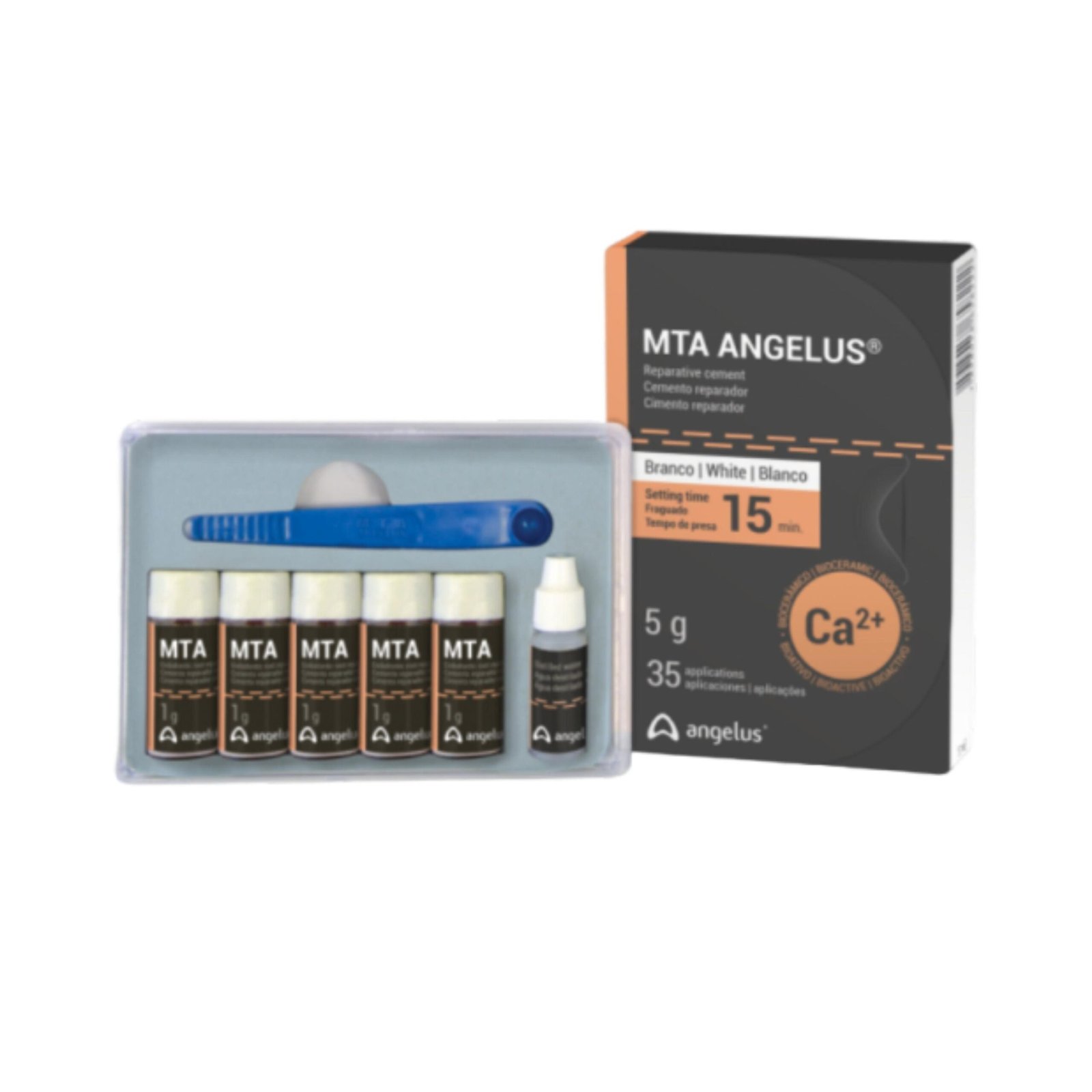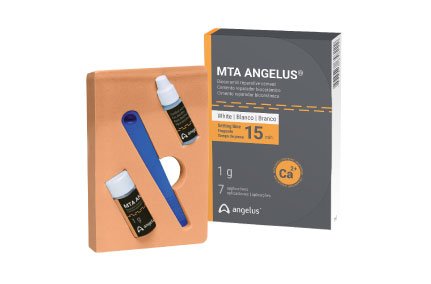About the product
Get to know MTA Angelus®
MTA ANGELUS
- Bioceramic reparative cement
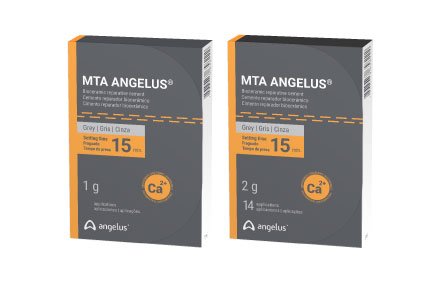
Indication
- Treatment of perforations of root canal and furcation caused iatrogenically or by caries lesion
- Via canal treatment of root perforation due to internal resorption (Sealing of internal and communicating root resorptions).
- Retrofilling in endodontic surgeries.
- Pulp capping in treatments.
- Direct Pulp Capping.
- Pulpotomy (removal of affected coronal pulp to preserve vitality of remaining pulp tissue).
- Apexification (induction of formation of a mineralized barrier at the root tip of young permanent teeth with incomplete root development and a necrotic pulp).
- Apexogenesis (induction of root development in vital teeth with an inflamed coronal pulp).
- Surgical treatment of root perforation due to internal resorption.
- Periapical surgery with reverse filling.
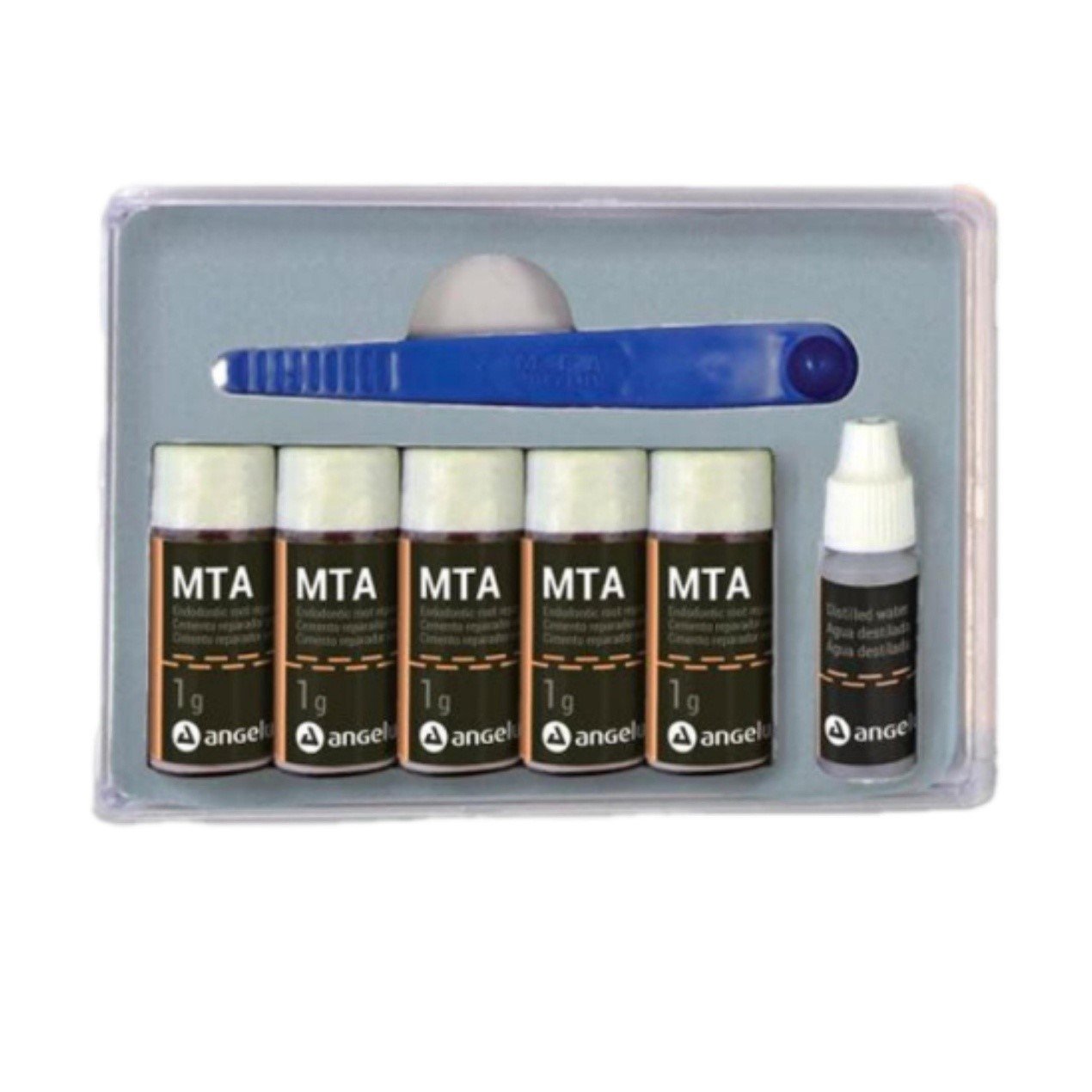
Advantages
- Ions Calcium Release: enhances formation of mineralized tissues; provides biological seal of perforations and total repair of damaged periradicular tissues.
- Capable of inducing neoformation of periradicular cementum: Biological action.
- Hydrophilic: can be used in humid areas without losing properties.
- High alkalinity: antibacterial properties.
- Low solubility: does not allow leakage.
- Calcium oxide: promotes tissue biocompatibility.
- Aggregated oxides: Great compressive strength.
- oxides
- Setting time of 15 minutes: shorter setting time than similar cements.
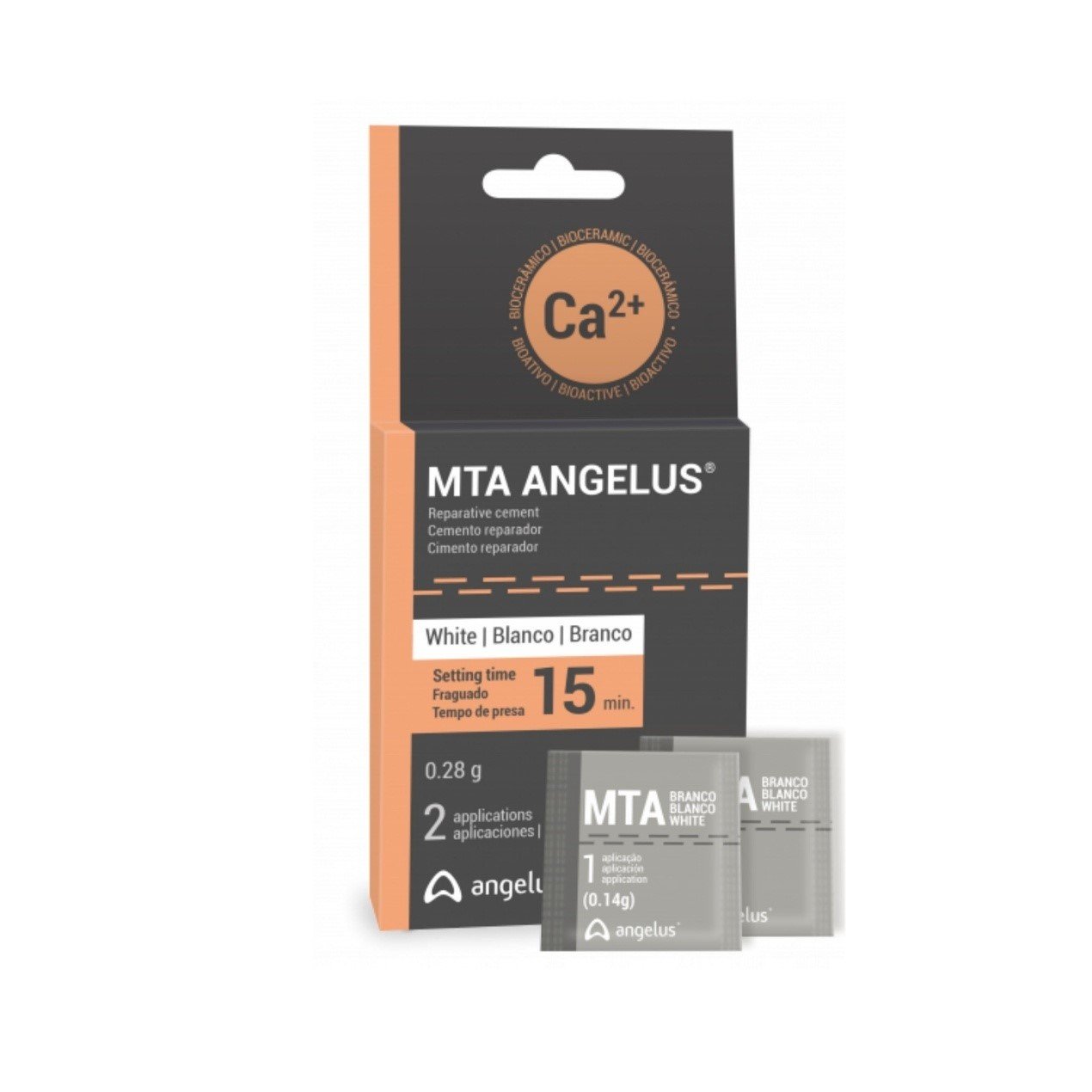
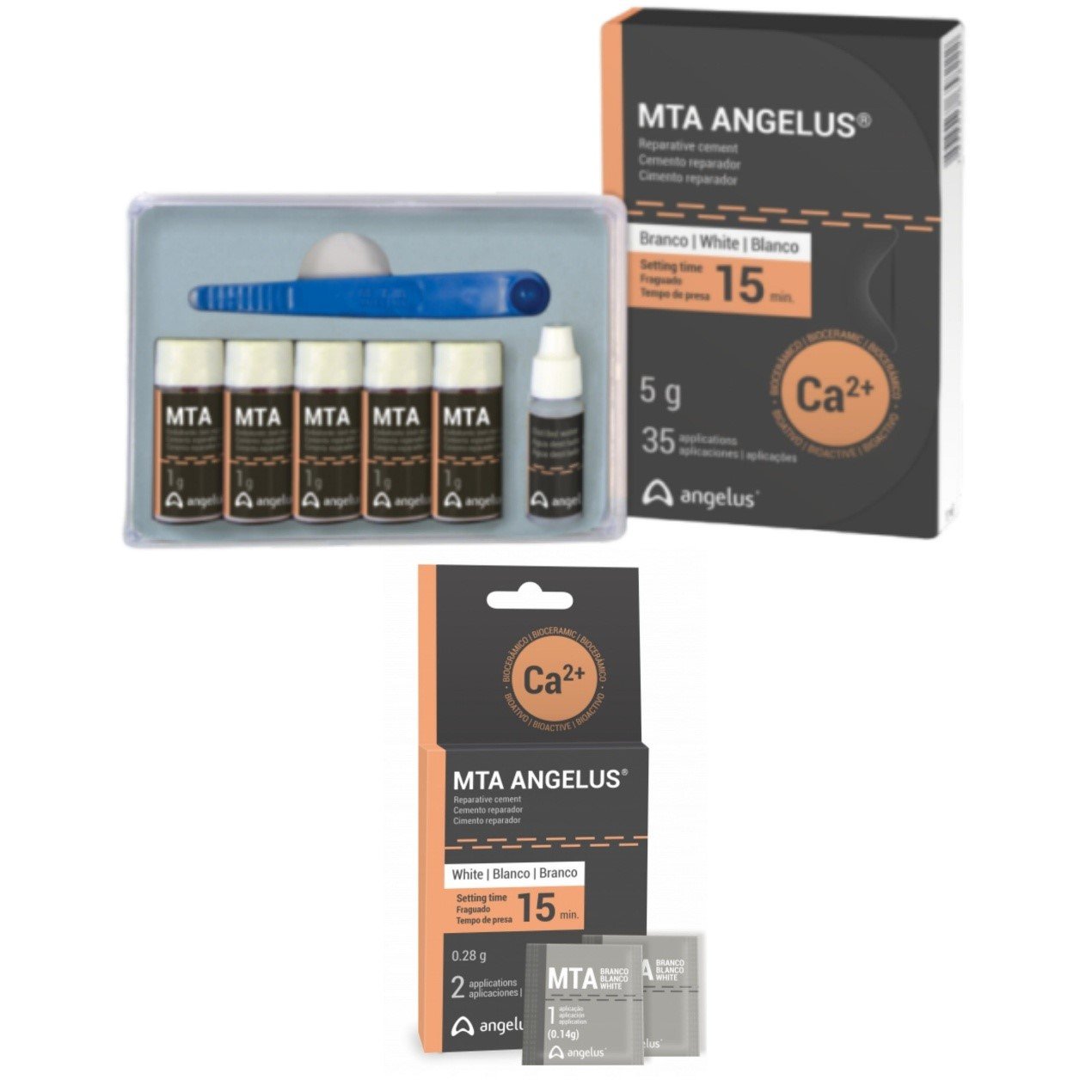
PRESENTATION
-
MTA Angelus White - 5Gm. Per box Contains:
• 5-1 Gm. MTA Glass bottles.
• 1-3 ml bottle distilled water.
• 1 plastic measuring scoop. - 2 sachets-Package MTA White, 2 sachets (0.14 g each) distilled water (3 ml).
Technical specifications
Everything you need to know about the exact specifications of the product
Video about the product
Frequently asked questions (FAQ)
Answers to your questions and inquiries about the product
Which are the main properties of MTA?
CHEMICAL
Release of calcium ions: allows formation of mineralized tissues
Highly alcaline: prevents bacterial growth
PHYSICAL
Low solubility: may be used directly on pulp and periapical tissues
Compressive strength: 44.2 MPa – may be used as base for restorations
Expansion after hydration: seals cavities completely
Setting time (15 minutes): may be used in single appointment
Radiopaque: allows radiographic control
BIOLOGIC
Biocompatibility: may be used directly on living tissues
New formation of cement: only dental material with this capacity
Remineralization of dentin: allows formation of biologic barrier
Biologic sealing of perforations: complete healing of periapical tissues
What is the difference between Gray MTA and White MTA?
White MTA has less iron oxide in its composition. This substance is the responsible for the darker color of the Gray MTA. Such reduction in the levels of iron oxide does not interfere with the great properties of the cement MTA.
Which are the indications of MTA?
- Treatment of root canal perforation.
- Treatment of furcation perforation.
- Treatment of root canal resorption.
- Retrofilling in periapical surgeries.
- Direct pulp capping.
- Pulpotomy.
- Apexigenesis.
- Apexification.
- Intracoronal barrier during tooth bleaching.
- Apical plug.
How is MTA applied?
The consistency of MTA is different when compared to conventional dental materials.
Its application may be performed with insertion spatulas, amalgam carriers or instruments specially designed for MTA handling (e.g., MTA Carrier and MAp System).
MTA should never be used with a Lentulo spiral because it needs to be directly placed in the area to be repaired.
Why is the setting time of MTA Angelus faster than of the other brands?
Since 2002, the setting time of MTA Angelus was modified from 2.5 hours to 15 minutes. This reduced setting time is exclusive of Angelus.
The concentration of calcium sulfate, which is the substance responsible for the long setting time, was decreased.
MTA Angelus allows final restorative treatment in the same clinical appointment of MTA insertion.
Can MTA be used as a final root canal final filler?
MTA does not have a proper consistency (flow) for final root canal filling. Also, after its setting, removal would be extremely difficult if reentry is necessary.
Brand or manufacturer
Meet Qasr Al-Tibb Medical Partners

The manufacturing company Anguls
Founded in 1994, Angelus is a dental consumable manufacturer, located in the south of Brazil, specialized in the areas of Restorative Dentistry, Endodontics, Pediatric Dentistry and Laboratory.
Concentrating its core competence in R&D, with a distinguished team of PhD's and partnership with scientists, Angelus is able to generate a great number of patented innovative products.
The results of this background gave Angelus the National Innovation Award, considered the " Oscar " of Brazil innovation.
Angelus has 6 certifications, ISO 13485, EN ISO 13485 + AC:2007, Directive 93/42/CEE, ISO 9001, RDC 59 e FDA that guarantee the quality system and allows its worldwide distribution to more than 65 countries in the five continents. Focusing on fiber reinforced materials MTA-based solutions and a clever line of pediatrician products, the company sustains a two-digit growth sinceits foundation.
Angelus believes that Innovation is the drive force that brings growth and benefits not only to itself but also to the Dentistry field and the communities around the world.


